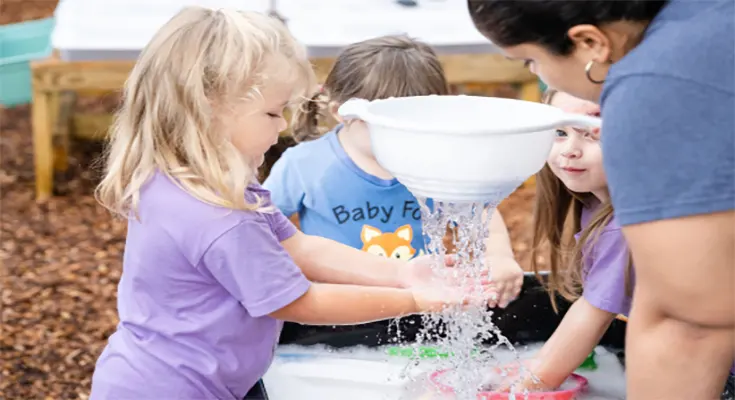Preschool is a crucial part of a child’s development. It prepares them for kindergarten and life beyond. Most parents are in agreement that preschool is important, but the question of how many years a child needs to attend preschool often arises. Answers vary depending on a number of factors including age, stage of development, and the individual needs. Parents can make informed decisions if they understand the benefits of preschool.
Understanding the purpose of Preschool
Preschool is a bridge that connects home to kindergarten. It offers children a place where they can learn essential skills, in a playful and structured environment. These programs usually focus on:
- Social and emotional development: Learn to share, cooperate and express emotions in a proper manner.
- Cognitive growth: Develop early literacy and numeracy skills, as well as problem solving abilities.
- Motor Skills: Improvement of fine and gross motor skills through structured play.
- Language Development: Improve communication and vocabulary.
- Encourage self-help skills such as dressing yourself, eating and following routines.
The number of years that a child requires in preschool can be adjusted based on the child’s readiness and family circumstances.
How Much Preschool is Enough?
One year of preschool can be enough to prepare a child for kindergarten. This is especially true if the child has been developing socially and academically well at home. This is a common option for children who begin preschool at four years old and move to kindergarten when they are five.
Benefits of a Year of Preschool
- Exposes students to a structured environment for learning.
- The basic motor, social and cognitive skills are developed.
- Prepares the child for the expectations and routine of kindergarten.
In some cases, a year of preschool may not be sufficient for children who require extra time to develop their emotional maturity, language abilities, or independence. An additional preschool year can be helpful in such cases.
Two Years of Preschool is a Common Choice
Families often opt for two years’ preschool, starting at age three and continuing up to kindergarten. This allows the child to gradually build their skills and confidence as they ease into school.
Benefits of Two Years Preschool:
- Gives you more time to develop socially and emotionally.
- Reinforce early academic skills such as number and letter recognition.
- Encourages self-regulation and independence.
- Children can adapt to learning in a group environment.
Two years of preschool can help children to enter kindergarten with a stronger foundation, making the transition easier and less stressful.
Three years of preschool: Is it necessary?
Some children, although less common, benefit from three years in preschool starting at age two. This option is usually recommended for children who have specific developmental needs such as social difficulties, speech delays or sensory issues.
Benefits of Three Years Preschool:
- Early intervention is available for children with developmental delays.
- Social skills are improved through extended peer interaction.
- Confidence and familiarity of school routines is built.
Three years of preschool is not necessary for all children. It can lead to boredom or fatigue if the program is not matched to their development stage.
What to consider when deciding
The number of years that a child should spend in preschool depends on a variety of factors.
- Child’s age and readiness: Some children adapt easily to structured learning environments while others require more time to develop their social and emotional skills.
- Developmental Milestones – If your child meets milestones that are age appropriate, one or even two years of pre-school may be enough. Additional preschool time is beneficial for children who are behind.
- Families: The availability of preschools and the work schedules as well as financial considerations will also affect your decision.
- Some children learn better in structured environments, while others are best taught through informal play and experiences at home.
Quality over Quantity: The Importance
The quality of the experience of preschool is just as important as the number of years spent in preschool. A high-quality program for preschoolers should:
- Offer a balanced program that combines play-based learning with structured learning.
- Create a nurturing, safe environment.
- Hire qualified teachers with a good understanding of child development.
- Encourage communication and involvement of parents.
Children who attend high-quality pre-school for one, two or three years are more likely to acquire the skills necessary for kindergarten success.
Preschool Alternatives
Families who want to explore or limit the number of preschool years they spend with their children can choose from several options that will support their early childhood development.
- Home-based Learning: Parents are able to provide structured learning at home that focuses on literacy, numeracy and social skills.
- Parent-Child classes: Classes like music, gymnastics and storytime in local libraries can help build social skills and encourage interaction.
- Playgroups: Children can interact with their peers in an unstructured setting.
Preschool – Tailoring to your Child’s Needs
No one answer fits all when it comes to the number of years a child needs in preschool. Some children may only need one year of preschool, while others might benefit from as many as two or three years depending on their development readiness and family circumstances. Preschool is designed to help children develop their cognitive, social and emotional skills in preparation for kindergarten. You can make an informed decision about your child’s early education by considering their unique needs and making sure they have access a high quality learning environment. This article was written by an expert at Baby Fox Academy of Florida. Baby Fox Academy, preschool Lakewood Ranch, FL is your premier choice for high-quality early childhood education, blending structured learning with the magic of play. Baby Fox Academy is owned and operated by Laurie McCracken and Matt McCracken. Laurie has over 25 years experience in the early childhood field. Our play-based program supports each child’s development by balancing activities indoors and outdoors that develop fine motor skills, language, creativity and independence. Children develop important skills through engaging tools such as puzzles, drama play, and art. WatchMeGrow allows parents to check-in at any time via “Trail Cams”, giving them peace of mind as their children play, learn and grow. Baby Fox Academy is a nurturing learning environment that will inspire your child to love learning for life.





